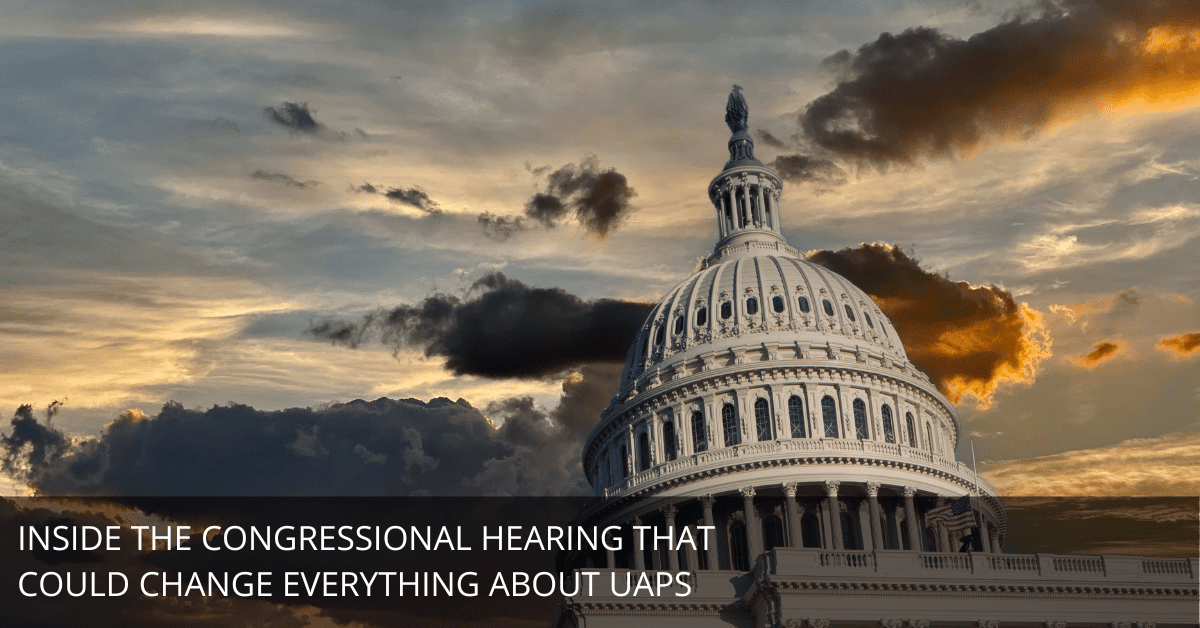
Let’s talk about the elephant in the sky—or rather, the one zipping through it at impossible speeds and vanishing into oceans without a trace.
On November 13, 2024, Congress held a joint subcommittee hearing titled Unidentified Anomalous Phenomena: Exposing the Truth. The event was packed with jaw-dropping revelations about UAPs (formerly UFOs), their implications for national security, and the systemic secrecy cloaking it all.
As a musician, author, and amateur ufologist, I often ask myself: "What can I do with all this information?" In this article, I’ll walk you through what happened, why it matters, and—most importantly—how you can act on it today.
What We Learned: UAPs Are Real, Advanced, and Mysterious
For decades, skeptics dismissed UFO sightings as swamp gas, misidentified weather balloons, or overactive imaginations. This hearing proved otherwise.
Witnesses, including a retired Navy admiral and a former Department of Defense official, confirmed:
- UAPs exist. They display advanced technology beyond any known human capabilities.
- These objects aren’t just hovering. They’re zipping past fighter jets, evading radar, and diving into oceans at torpedo speeds.
- The government has known this for decades, collecting high-resolution images, videos, and data. Most of it remains classified.
For example, one witness described a UAP following a nuclear submarine during a storm in the North Atlantic. The UAP outpaced the submarine, matched its movements, and then vanished. Try explaining that with a flock of birds.
Why It Matters: Safety, Science, and Secrecy
Here’s why this isn’t just a topic for sci-fi fans.
1. Aviation Safety
UAPs pose a tangible risk to both military and civilian aviation. Pilots report near misses and strange objects interfering with flight paths, yet many hesitate to file reports, fearing stigma or retaliation.
2. Scientific Opportunity
We’re looking at technology that defies the laws of physics—or at least our current understanding of them. Imagine the breakthroughs we could achieve by studying UAPs: new energy sources, propulsion systems, or insights into quantum mechanics.
3. Eroding Trust
When governments suppress information, it fuels conspiracy theories and public distrust. Transparency is not just a nice-to-have—it’s a necessity.
What You Can Do Right Now
So, what can you, as an individual, do about something so vast and tightly guarded? Plenty. Let’s break it down.
1. Demand Transparency
This is your taxpayer money funding these investigations (or cover-ups). You have a right to know what’s being done in your name.
Here’s how to start:
- Write to your congressional representatives and ask them to support legislation like the UAP Disclosure Act or the Safe Airspace for Americans Act.
- Use this template:
Dear [Representative/Senator's Name],
I am writing to urge your support for greater transparency regarding Unidentified Anomalous Phenomena (UAPs). Recent Congressional hearings have revealed a disturbing lack of oversight and accountability on this matter. As your constituent, I believe the American people deserve to know how our government is addressing these phenomena, which have implications for safety, science, and national security. Please support [specific legislation].
Sincerely,
[Your Name]
Take 5 minutes to send this email. Multiply that by thousands of concerned citizens, and change happens.
2. Educate Yourself and Others
Knowledge is power. Start by diving into credible resources:
- Books like The Report on Unidentified Flying Objects by Edward J. Ruppelt or Imminent by Luis Elizondo.
- Websites like The Black Vault, which archives declassified government documents.
- Podcasts (like the UFO Rabbit Hole) or documentaries from reputable sources.
Then, share what you learn. Post on social media, host discussions, or bring it up casually in conversation—because the more people know, the harder it becomes to bury the truth.
3. Join the Fight Against Stigma
Let’s face it: UFOs still get the X-Files treatment. Pilots fear reporting sightings. Scientists shy away from the subject. Even Congressional witnesses have faced ridicule.
What you can do:
- Normalize the conversation. Instead of joking about "little green men," frame UAPs as a scientific and national security issue.
- Support whistleblowers. When brave individuals risk their careers to share the truth, amplify their voices by sharing their stories online or donating to legal funds that protect them.
4. Track the Legislation
Follow bills like the UAP Disclosure Act. Are they progressing? Who’s supporting or opposing them? This information is public, and platforms like Congress.gov make it easy to track.
Here’s what to do next:
- Sign up for email alerts on relevant bills.
- Call or email representatives who oppose transparency and politely but firmly request their support. Let them know you’re paying attention.
5. Stay Curious, Stay Active
Let this hearing be the start, not the end, of your involvement. Keep asking questions:
- What’s being done with the data NASA collects?
- Why are UAP hotspots often near nuclear installations?
- What’s inside those hangars private companies lease from the government?
Keep digging. Keep talking. And don’t stop until we have answers.
Why It’s Worth It
Think about this: In 200 years, how will historians write about the 21st century? Will it be the era when humanity discovered we weren’t alone in the universe? Or will it be a footnote about opportunities missed due to fear and secrecy?
The truth is, we’re standing at the edge of something extraordinary. But we’ll only take the leap if enough of us demand it.
So, start today. Write that email. Read that book. Share that post. The sky isn’t the limit—it’s just the beginning.

